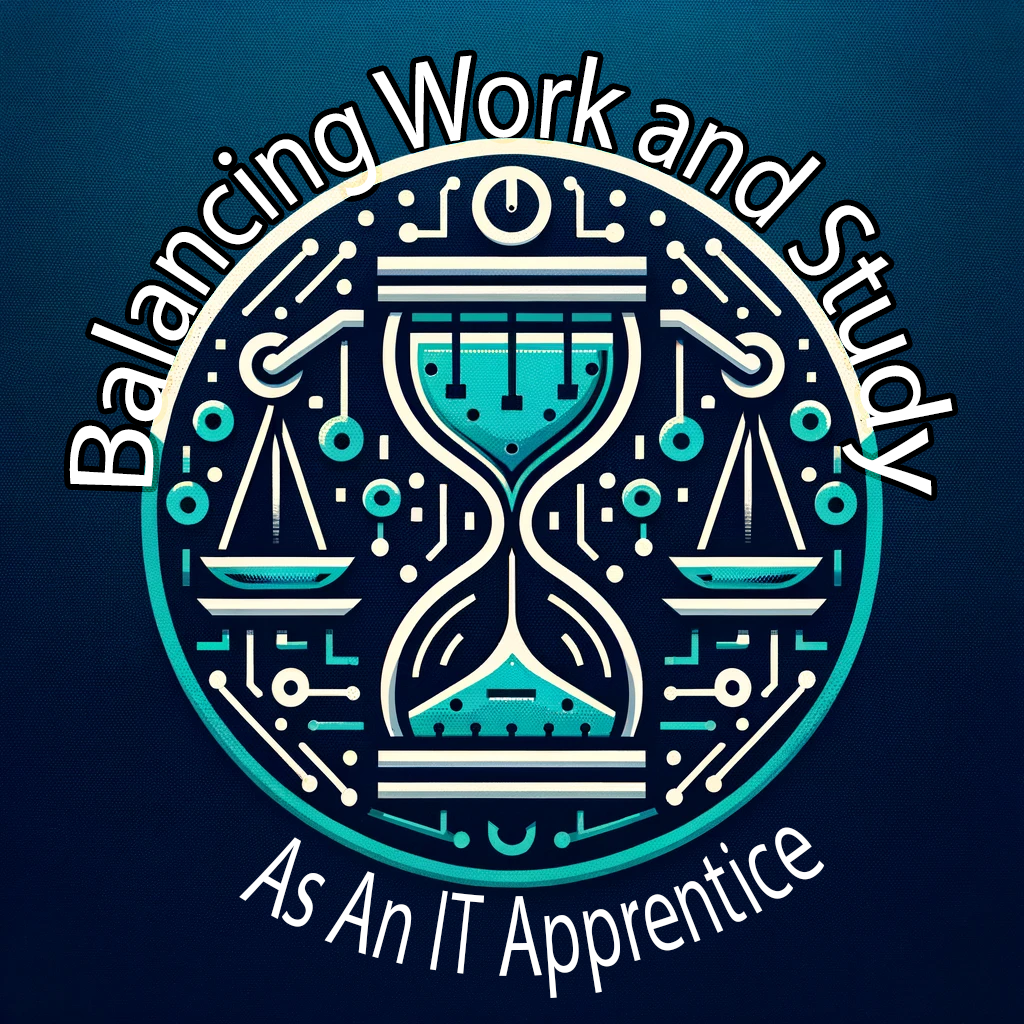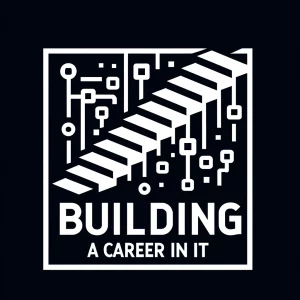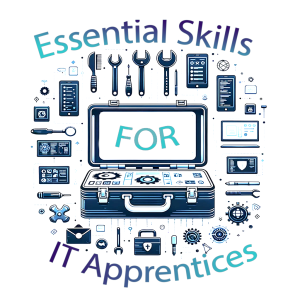Balancing Work and Study as an IT Apprentice: Tips for Managing Time Effectively – Introduction
In any area of IT, juggling the demands of work and study can be a daunting task. When I first started my apprenticeship, I found myself struggling to find a balance between my job responsibilities, coursework, and personal life. It was a steep learning curve, but through trial and error, I discovered strategies that helped me manage my time effectively and thrive in both my professional and academic pursuits. IT can often be difficult Balancing Work & Study from other tasks and priorities. Keep reading to find out more.

Core Content of Balancing Work & Study
1. Setting Realistic Goals
One of the most important lessons I learned during my apprenticeship was the value of setting realistic goals. When I first started, I had a tendency to overcommit, thinking I could handle everything on my plate. However, I quickly realized that spreading myself too thin only led to burnout and subpar performance.
To combat this, I began setting weekly goals for both my work and study commitments. Every Monday morning, I would take a few minutes to outline my priorities for the week, ensuring that my goals were specific, measurable, and achievable. This practice helped me manage my expectations and track my progress, giving me a sense of control over my workload.
2. Effective Time Management Strategies
Effective time management is crucial for balancing work and study as an IT apprentice. One of the strategies that worked well for me was prioritizing tasks based on their urgency and importance. I used the Eisenhower Matrix, which categorizes tasks into four quadrants: urgent and important, important but not urgent, urgent but not important, and neither urgent nor important. By focusing on the tasks in the first two quadrants, I was able to allocate my time more efficiently and avoid getting bogged down by less critical tasks.
Another helpful tool I used was a digital calendar to schedule my work, study, and personal commitments. I color-coded my calendar entries to easily distinguish between different types of activities, and I made sure to block out dedicated study time each day. This visual representation of my schedule helped me stay organized and ensured that I was allocating sufficient time to each area of my life.
To give you a better idea of how I structured my time, here’s a glimpse into a typical week during my apprenticeship:
- Monday to Friday:
- 9:00 AM – 5:00 PM: Work
- 4:30 PM – 6:30 PM: Study time
- 7:00 PM – 8:00 PM: Exercise or leisure activities
- Saturday:
- 9:00 AM – 12:00 PM: Study time
- 12:30 PM – 6:00 PM: Personal time
- Sunday:
- 10:00 AM – 2:00 PM: Study time
- 2:30 PM – 6:00 PM: Personal time
3. Leveraging Resources
As an IT apprentice, it’s essential to make the most of the resources available to you. One of the most valuable resources I had was the opportunity to learn on the job. I made a conscious effort to treat every work task as a learning experience, asking questions and seeking guidance from my colleagues when needed. This approach not only helped me develop my technical skills but also allowed me to apply my theoretical knowledge in real-world situations.
In addition to on-the-job learning, I also leveraged various study resources to support my academic progress. Online tutorials, forums, and study groups were invaluable in helping me grasp complex concepts and expand my knowledge base. I found that engaging with the IT community through platforms like Stack Overflow and GitHub not only provided me with answers to my questions but also exposed me to new ideas and best practices.
One of the most enriching aspects of my apprenticeship was the opportunity to discuss technical topics with my coworkers and mentors. I made a habit of initiating conversations about the projects I was working on, seeking feedback and insights from more experienced professionals. These discussions not only deepened my understanding of the subject matter but also helped me build strong relationships with my colleagues.
4. Maintaining Well-Being
Balancing work and study can be mentally and physically taxing, which is why it’s crucial to prioritize your well-being. One of the most important things I learned during my apprenticeship was the significance of maintaining a healthy work-life balance. I made sure to set aside time for activities that helped me relax and recharge, such as going for walks, reading, or spending time with friends and family.
To manage stress effectively, I practiced mindfulness techniques like deep breathing and meditation. These practices helped me stay grounded and focused, even during challenging times. I also found that regular exercise, whether it was a quick jog or a yoga session, was a great way to release tension and boost my overall mood.
Another crucial aspect of maintaining well-being was learning to recognize when I needed a break. There were times during my apprenticeship when I felt overwhelmed and on the verge of burnout. In those moments, I learned to step back, reassess my priorities, and give myself permission to take a breather. This could mean taking a mental health day, delegating tasks, or simply saying no to additional commitments.
5. Review and Adjust
As I progressed through my apprenticeship, I realized that what worked for me in terms of time management and productivity might not always remain effective. Life circumstances change, and it’s essential to be adaptable and open to adjusting your strategies as needed.
I made it a habit to regularly review my time management techniques and assess their effectiveness. If I found that a particular method was no longer serving me, I wasn’t afraid to experiment with new approaches. For example, when I started my apprenticeship, I relied heavily on handwritten to-do lists. However, as my responsibilities grew, I discovered that using a digital task management app allowed me to better organize and prioritize my tasks.
Continuous improvement and adaptability were key to my success as an IT apprentice. By being willing to learn from my experiences and make necessary adjustments, I was able to refine my time management skills and find a balance that worked for me.
To conclude on Balancing Work & Study in IT
Balancing work and study as an IT apprentice is no easy feat, but with the right strategies and mindset, it is achievable. Setting realistic goals, implementing effective time management techniques, leveraging available resources, maintaining well-being, and being open to continuous improvement are all essential components of successfully navigating this challenging journey.
To my fellow IT apprentices, I encourage you to experiment with different approaches and find what works best for you. Remember that it’s okay to make mistakes and adjust your strategies along the way. The key is to remain committed to your goals, be kind to yourself, and never stop learning.
If you’re an IT apprentice struggling to balance work and study, know that you’re not alone. I’d love to hear about your experiences and the strategies that have worked for you. Share your thoughts in the comments below, and let’s start a conversation about how we can support each other in this exciting but demanding journey.
For more tips and insights on navigating the world of IT, be sure to subscribe to my blog. Together, we can learn, grow, and thrive in this dynamic and rewarding field. Interesting post here if you want to read more externally.
Next guides in the series |
Guide to IT Apprenticeships: Overview of different types of apprenticeships, what they entail, and which might be right for different interests and skills.
https://theitapprentice.com/blog/guide-to-it-apprenticeships/Searching for an IT Apprenticeship in 2024: How to find your next IT job as an apprentice in 2024 and use advanced techniques and methods to find them
https://theitapprentice.com/blog/searching-for-an-it-apprenticeship-in-2024/Applying for Your First IT Apprenticeship: Step-by-step application process, tips for standing out, and common mistakes to avoid.
https://theitapprentice.com/blog/applying-for-an-it-apprenticeship-in-2024/Age Is Just a Number: Addressing age-related concerns in IT apprenticeships, showcasing examples of successful apprentices from various age groups.
https://theitapprentice.com/blog/age-is-just-a-number/Building a Career from an IT Apprenticeship: How to leverage an apprenticeship for career advancement, using your career as a case study.
https://theitapprentice.com/blog/building-a-career-from-an-it-apprenticeship/Essential Skills for IT Apprentices: Key technical and soft skills that will help apprentices excel in their roles.
https://theitapprentice.com/blog/essential-skills-for-it-apprentices/What to Expect in Your First Year as an IT Apprentice: Month-by-month guide of challenges and milestones.
https://theitapprentice.com/blog/what-to-expect-in-your-first-year-as-an-it-apprentice/Balancing Work and Study as an IT Apprentice: Tips for managing time effectively, based on your personal experiences.
https://theitapprentice.com/blog/balancing-work-and-study-as-an-it-apprentice-tips-for-managing-time-effectively/- Navigating the First Job Offer Post-Apprenticeship: How to evaluate job offers, negotiate salaries, and decide the best path forward.
https://theitapprentice.com/blog/navigating-the-first-job-offer-post-apprenticeship/ - Certifications to Boost Your IT Career: Recommendations on certifications that are beneficial for apprentices, tailored to different IT paths.
https://theitapprentice.com/blog/certifications-to-boost-your-it-career-tailored-guidance-for-it-apprentices/
Join Our Community!
🌟 Get exclusive insights and the latest IT tools and scripts, straight to your inbox.
🔒 We respect your privacy. Unsubscribe at any time.










